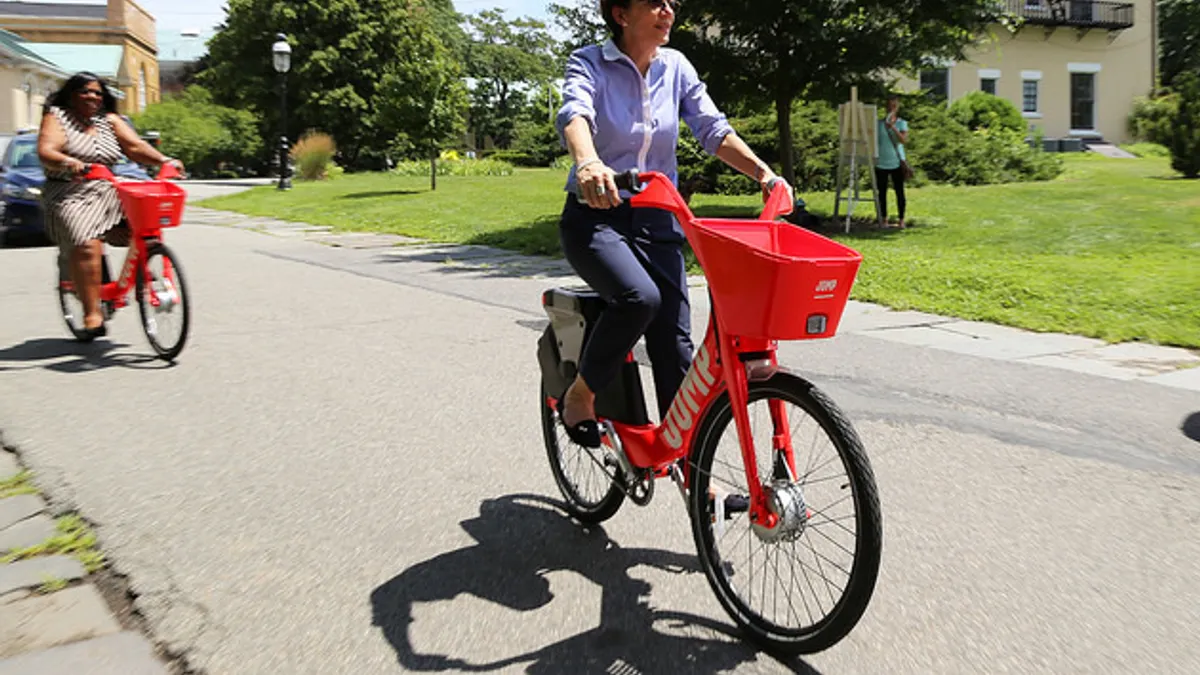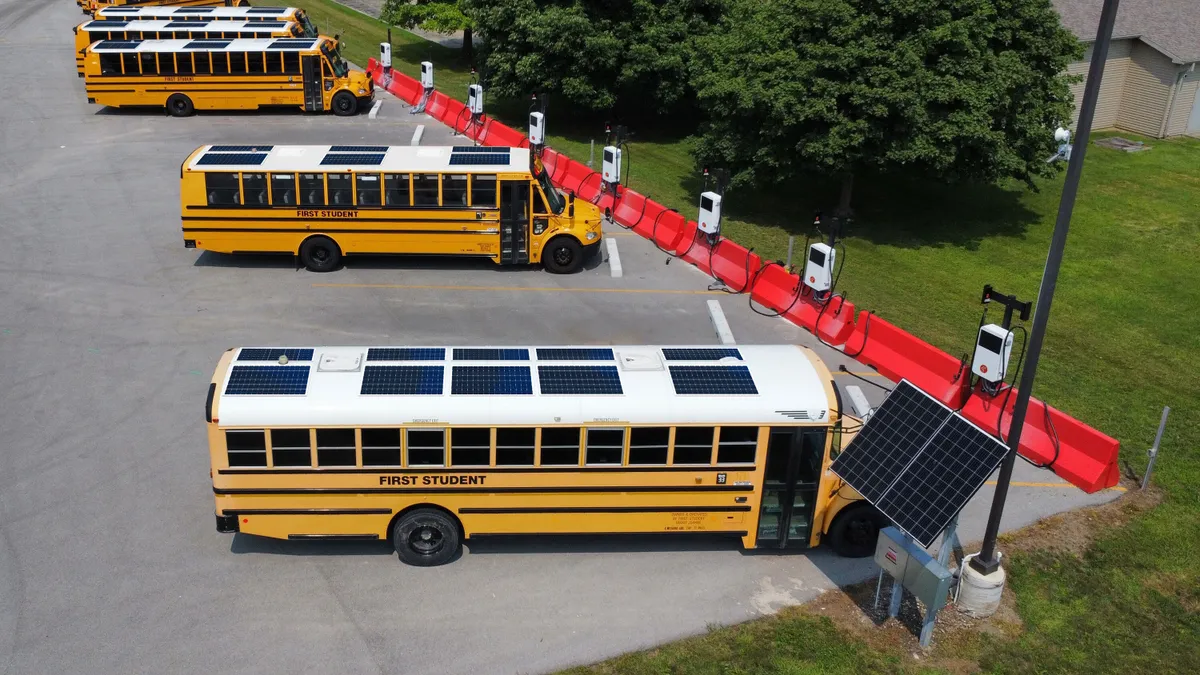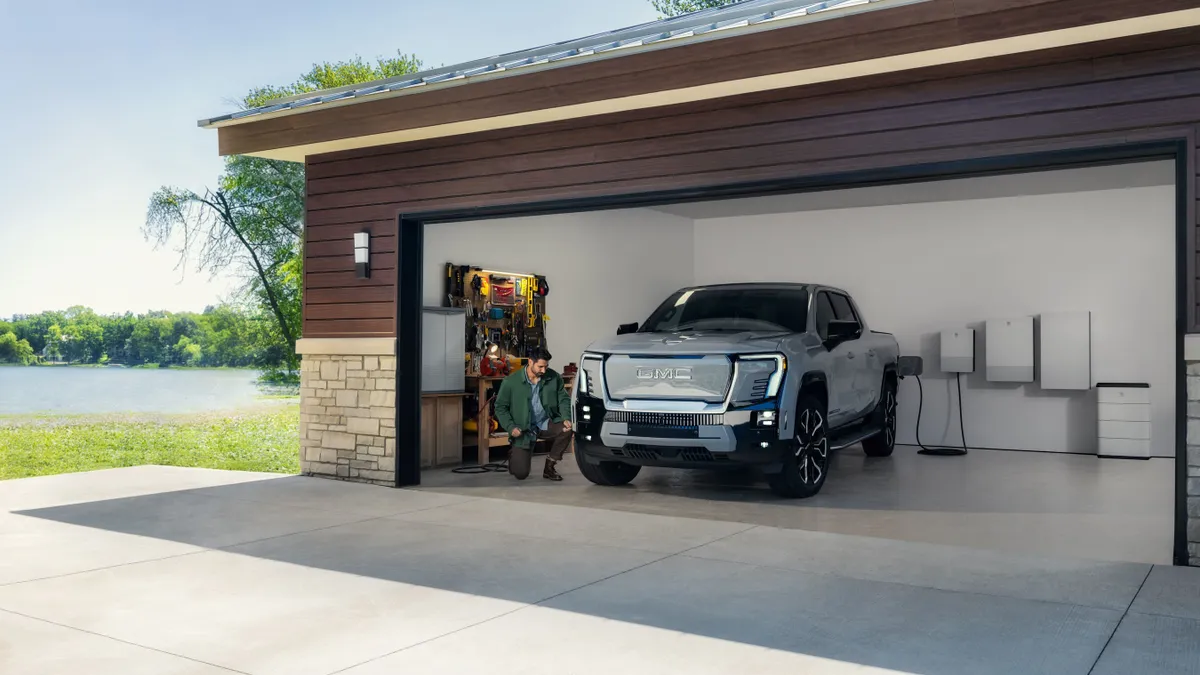Seemingly overnight, dockless bikes and scooters have come to dominate city streets across the U.S., and such takeover isn't slowing down moving into 2019.
Over the last year-and-a-half, the number of companies entering the competitive micromobility industry has mushroomed. Dockless bikes and scooters have even invaded pop culture, becoming the subject of laughs on late-night television and episodes of popular shows like "South Park."
But what comes next for the burgeoning industry? Continued expansion into new markets would be in keeping with this year’s trends, while there is also talk of updating technology and improving safety. Meanwhile, cities will likely wrestle with regulation of this new transportation option, as well as its impact on infrastructure both old and new.
"One of the things that's very exciting is that a year ago, we weren't even having those conversations," Brandon Pollak, director of global civic engagement and strategy at Bird, said during a summit hosted by The Atlantic in Washington, DC. "Scooters were not even part of the conversation. Cities have really been embracing this."
Expansion
While dockless bikes and scooters may feel almost ubiquitous in the United States, they are not in every state. An analysis by Smart Cities Dive found 11 states currently lack a dockless presence: Alaska, Iowa, Kansas, Louisiana, Maine, Montana, New Hampshire, North Dakota, Pennsylvania, South Dakota and Wyoming.
With dockless companies targeting 1 trillion rides annually worldwide, one might expect them to aggressively target states that currently lack dockless networks. But complicating factors, including state laws and colder climates, make things more difficult.
The Missoulian reports that the city of Missoula, MT is studying the possibility of introducing scooters — which could be complicated due to the city's cold winters — while Bird and Lime have expressed some interest in entering that market but have not pulled the trigger. Meanwhile, Philadelphia’s efforts to add electric dockless scooters appear to have run afoul of state law. A fact sheet from the Pennsylvania Department of Transportation (PennDOT) says that scooters "cannot be operated on Pennsylvania roadways or sidewalks," so it may need a change in state law before Bird, Lime and others can descend.
"This is a global opportunity, but not every city is going to be ready to make this transition as soon as some other cities," Michael Keating, CEO of Scoot, said on a conference call hosted by media company The Information.
"Those days of giving the middle finger to governments by startups are long over."

Brad Pollak
Director of Global Civic Engagement and Strategy, Bird
Smaller companies like Spin are positioning themselves to make forays into new markets, too. Recently acquired by Ford Motor Company, Spin is in just over a dozen markets but aims to be in around 100 by the end of 2019.
Brian No, Spin’s head of public policy, said that it goes into "markets that we think are appropriate and also where we have a permit or some sort of permission." He said they and Ford have big aims.
"I think what's been made clear is Ford does want us to grow as responsibly and as quickly as possible," he said during a recent event in Washington, DC when Spin launched its scooters in the city.
Companies have come under fire from some cities for bringing in their dockless vehicles unannounced, with some instituting bans after the fact as they wrestle with how to manage the new mobility option. But Pollak rejected those charges. "I wouldn't characterize it as dropping scooters. I can't comment on how my competitors focus on going into a market," he said.
Instead, he said companies always look to "strategically partner with cities every step of the way,” and lay the groundwork to do so with local departments of transportation and elected officials.
"Those days of giving the middle finger to governments by startups are long over," Pollak said. "Really you need to work with them, showcasing how you'd be a partner."
And international expansion could well be on the cards. Lime recently announced its launch in London, while there have been similar moves by dockless companies into Canada, Australia, New Zealand, Latin America and Israel. YJ Fischer, Bird’s senior director for global partnerships, said that bodes well.
"It's just one of these things where you sometimes hear people call it a fad, but it is really easy,” she said during the LA CoMotion conference in Los Angeles in November. "As soon as you use one, you see exactly why this has taken off so quickly. It is such a simple mode of transportation, and in communities where it is impossible to get around via car: the amount of gridlock, the amount of traffic."
Regulation
As the growth of dockless bikes and scooters continues, cities will most likely also continue to wrestle with the need to regulate the growing industry. Some have used pilot programs to learn more about the industry before introducing permanent rules and regulations, and that trend is likely to continue next year.
For companies, the idea that they must partner with cities in introducing bikes and scooters is becoming a bigger point of emphasis, lest they find themselves punished with an outright ban on their offerings. Ryan Rzepecki, CEO of Jump, said cities have also learned lessons from the introduction of ride-hailing, which came in unannounced and led to massive disruption.
"People, when they initially entered the space, were like, 'We can just put vehicles out on the street and the cities don't really have a role in this,'” Rzepecki said on The Information’s conference call. “I think we're seeing very clearly that cities have an important role in regulating the public space and they're going to be active in that."
What form that takes remains to be seen, although there have been some common trends. Cities have often taken to requiring scooters and bikes park in certain designated areas, while limiting the vehicles’ speeds and preventing them from being ridden on sidewalks except under very narrow circumstances. San Jose, CA could be the first to use geofencing to enforce the latter.
There is even less certainty around how many dockless bikes and scooters are allowed on city streets per company, with some being strict while the likes of San Diego have been more relaxed. Washington, DC upped its per-company cap on dockless vehicles and made that cap dynamic, meaning it can respond to usage and be increased if necessary. But Fischer said such caps make it difficult for companies to serve all their potential customers.
"We really do need to create the kind of ubiquity that allows us to solve those kinds of transportation deserts," she said.
Regardless of what happens next year in terms of regulations, South Bend, IN Mayor Pete Buttgieg said it is a good thing that such rules are being hashed out at the city level, albeit with the looming threat of state pre-emption from state legislatures.
"You have thousands instead of 50 municipalities that can take the first steps toward regulating these things, and then we can harmonize it,” Buttgieg said during a panel discussion hosted by The Washington Post. “I hope before the states pre-empt us, as they tend to do, that we're given some room to has things out and figure out what really matters."
Technology
Perhaps the most tangible improvement in dockless bikes and scooters city residents will see is in technology, which has already made strides this year and is likely to do more of the same next year. That could bring big advancements to the industry, Rzepecki said, as much of the mass-produced equipment is "quickly falling apart" so needs to be of a higher quality if scooters are to become even more popular.
Already, Lime and Bird have both made moves towards rolling out newer versions of their dockless vehicles. In October, Bird unveiled its Bird Zero scooter, which it said would be the "first rugged e-scooter" with a longer battery life, solid tires, a wider chassis and more advanced technology including an electronic speed limiter and improved GPS.
Meanwhile, Lime’s new iteration of its scooter makes similar promises with battery life, ease of use and resilience, while it said its digital screen will help its scooters communicate issues like entering no-parking zones, riding on sidewalks or being improperly parked.
Consolidation and acquisition may also help push the technology along. With Ford having bought Spin, No said their manufacturing experience could be helpful as Spin looks to enter a new era and move past off-the-shelf models. He suggested that, as well as wider wheels and a more robust structure, new vehicles could include turn signals.
Ford’s financial backing also allows Spin to be more deliberate in its decisions and focus on steady growth rather than delivering quick wins and good publicity to satisfy investors.
“That environment really lets us focus on how can we actually do this in a much safer, more robust, much more meaningful way, to make it a mode that people actually will use," No said.
Those technology advances also look set to involve non-scooter initiatives, including the likes of Bird Platform, which allows individuals the chance to manage their own fleet of Bird scooters, while partnerships to track availability are also likely to continue. Also this month, Lime announced it would team up with Google Maps to locate nearby scooters and bikes.
Safety and infrastructure
While the technology may be improving, the onus will also be on cities and companies to improve the safety around dockless vehicles, given the injuries and deaths that have occurred already.
Pollak said Bird is "obsessed with safety," and has looked to foster a safety culture by giving out 50,000 free helmets, with more to follow in the future.
Lime, meanwhile, has its “Respect the Ride” program, where it has invested over $3 million to help improve public safety and educational outreach, and plans to do more. But criticism remains, with a University of Southern California study arguing Bird does not do enough to promote safe riding on social media and the Centers for Disease Control and Prevention (CDC) to study dockless scooter use and examine the health risks.
Perhaps one of the biggest safety issues that remains is scooters being ridden on sidewalks, something Fischer said Bird and others must continue to address through rider education.
"It drives us crazy,” she said of scooters being ridden on sidewalks. “It drives all our non-users crazy, and I would argue it drives some of our users crazy when they are not on a scooter. Scooters are not meant to be ridden on sidewalks.”
No said that Spin could look to push a national safety standard for the adult usage of electric scooters, as no such standard exists currently. This is different from bicycles, he noted, which are governed by Consumer Product Safety Commission (CPSC) rules, among others.
And to enhance safety for all road users, cities will likely have to consider how to upgrade or update their infrastructure, with scooter companies calling for protected bike lanes to be used at a far greater scale.
"Where scooters go is where bikes should be going: in the bike lanes, on the road, on the side of the road,” Pollak said. “They shouldn't be riding on the sidewalk. Scooters and bikes should be living harmoniously."
But for city leaders, the problems presented by dockless bikes and scooters in existing infrastructure are many, especially given the strain on streets and bike lanes that already have many other modes of transportation using them.
“We have several trails in College Park, MD and we already have some conflict between pedestrians and cyclists who use those trails," College Park, MD Mayor Patrick Wojahn said during the Spin event in Washington, DC. "When we start adding scooters in the mix, I can imagine that is going to continue to add to that challenge."
No signaled a willingness among some companies to partner with cities even more, including on areas like street design, dedicated parking and other infrastructure investments. He said that the time is now for municipalities to act.
"Oftentimes, a lot of jurisdictions will say, 'Well, maybe we shouldn't do scooters now because our infrastructure isn't good enough. Let's wait until our infrastructure is good enough,'” he said. “Well that'll never happen in that case. It's a virtuous cycle in our opinion."




















